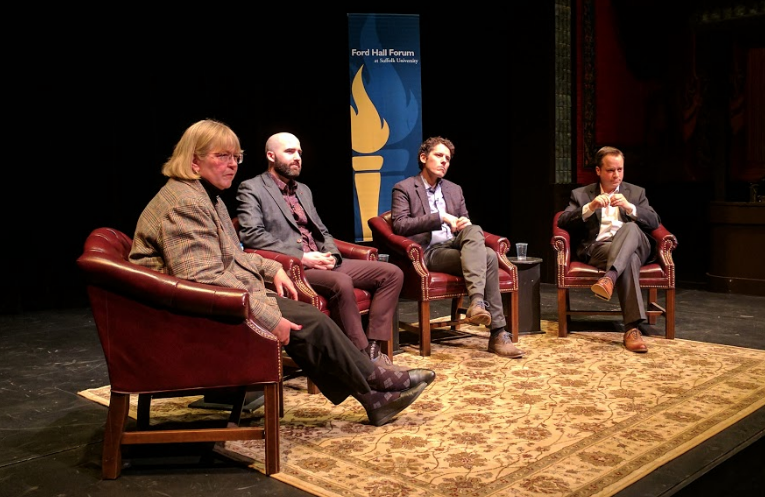During the 2016 presidential campaign, the term “fake news” exploded in popularity. At the start of the election season, this term was connected to stories that some believed were intended to discredit or benefit one candidate over the other, and had grown to a point where it would be difficult to find a publication that has not been accused of being fake news.
Last Wednesday night, three journalists spoke at Suffolk University’s Ford Hall Forum on their continuing careers in organizations that have been labeled by some as “fake news,” as well as what role journalism should play in a democratic society. These journalists, Joe Mathieu of WBZ NewsRadio, Matt Viser of the Boston Globe and Evan Engel, formally a Vocative senior producer, all have spent time having been accused of false reporting by the public, or by the current executive administration.
Matt Viser told his story of having been the subject of false reporting after controversy arose when he spoke on “The Lead” with Jake Tapper. While on the show, CNN ran a headline under Viser’s name that read, “Alt-Right Founder Questions if Jews Are People,” referencing an inflammatory statement by known white-supremacist Richard Spencer.
A screenshot of this CNN segment that showed the headline directly below an image of Viser immediately went viral on Twitter, and created a false association between Viser and the quote that incited intense anger focused directly at Viser for what people believed he had said.
“Everybody’s instinct was sort of to quickly react to what they thought that they were seeing,” said Viser.
The speakers discussed how this had been the perfect-storm combination of a poorly written headline, bad reporting and an overly quick viral response to comment on it by the general public.
In January, Engel found himself facing nearly 10 years in prison after he and five other journalists who were charged with felony rioting while reporting on violent protests outside of the inauguration of Donald Trump. The charges were dropped after a week, but for some, the accusation had changed their image of Engel.
Engel said that at the Trump inauguration he, “witnessed police abuse that is not the most alarming police abuse you’ve ever heard about, but is still the sort of thing that as a journalist you want to report. But when I brought it back to Vocative, they were adamant that I not report it and that I not speak about it in front of any forum, including this one.”
After being asked to not report on the event, Engel decided to leave the publication and began to speak more about his experience. He said that to him it was more of a joke, but the public immediately became highly polarized on the subject, he noted that “there are people who reflexively justify any action a police officer takes, and so in their eyes I was instantly at fault, without question at fault. But there are also people that get mad at any journalist for challenging power, so there were accusations of fake news. Someone said I was an Israeli spy.”
Engel said that the public was quick to label any speaking out he did on the situation as fake news if it disagreed with the point of view of the law enforcement.
Joe Mathieu said he believed 2008 began a new era of people who began to use social media as a primary source of news. He said that, “the internet was really for the first time a mainstream news dissemination tool for all ages, now everybody was reading online.”
Mathieu explained that it was at this point the public began to become more exposed to the ultra right and left groups that had attempted to broadcast messages for years, but were just beginning to gain an influential voice.
Viser instructed that if people wanted to become immune to the biases in news, they should
“Be skeptical, Sean Spicer said in one of his first briefings about how, ‘We’re going to call you guys out,’ to the media,” said Viser. “I’m fine with that, call us out, if people think that we’re not being fair or open. I think [you should] read everything, expose yourself.”















